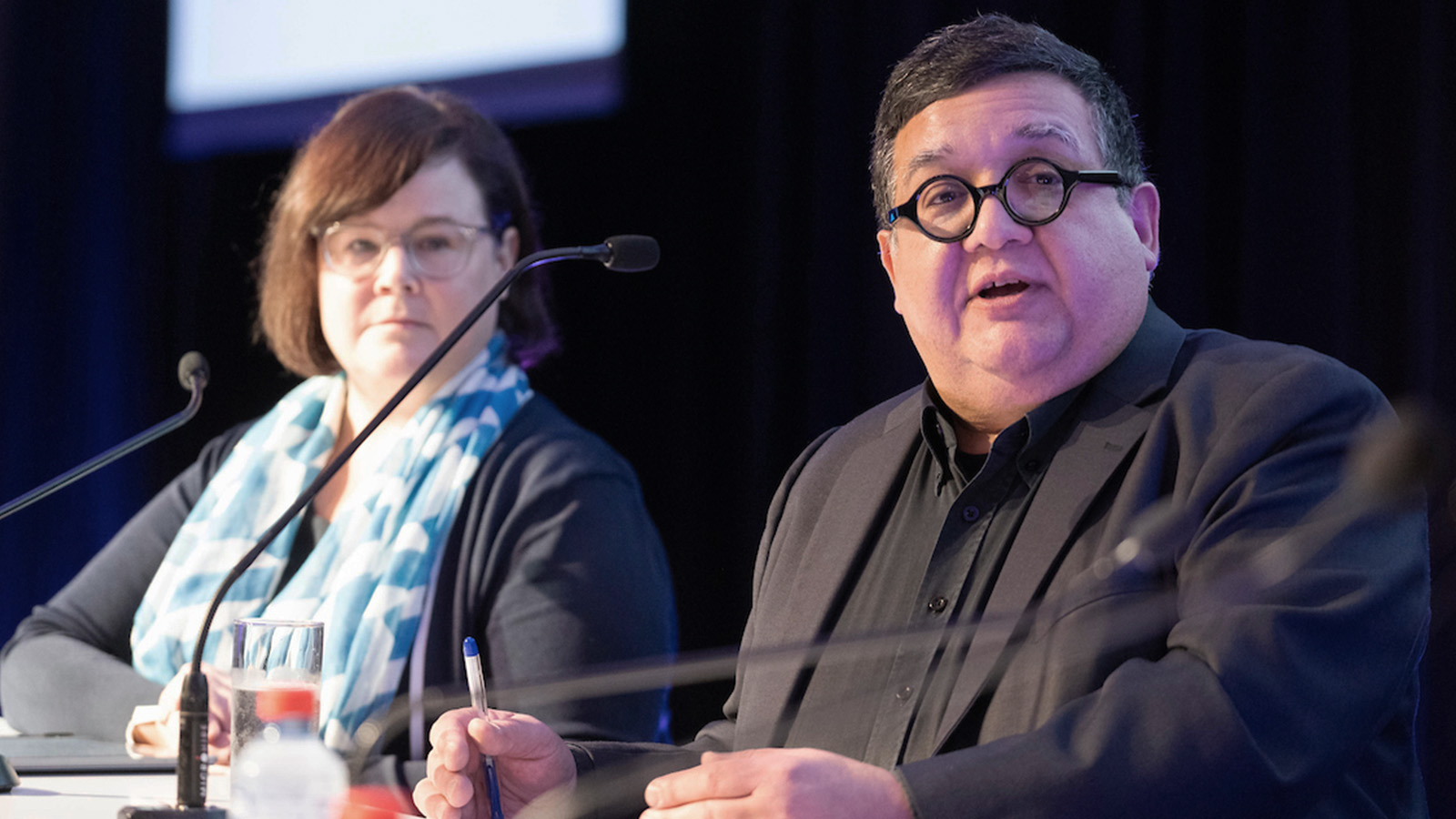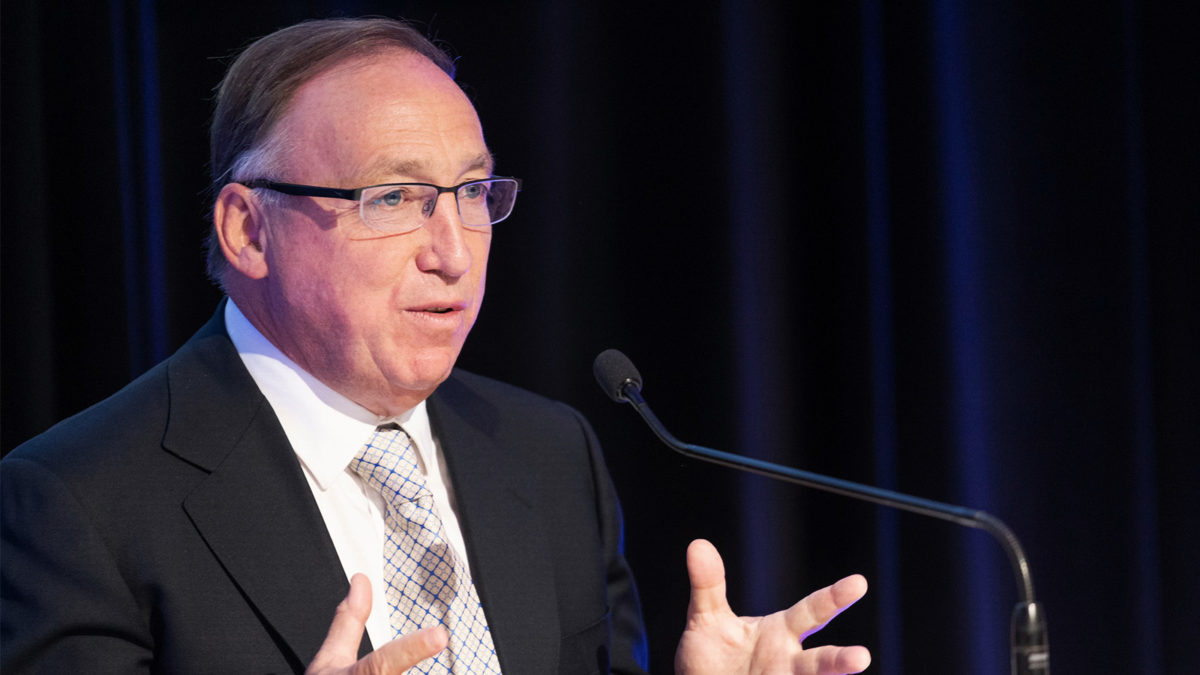Why industry funds must keep ‘the hunger to succeed’: Delaney
Arriving at work one morning in October 1987, now AustralianSuper chief investment officer Mark Delaney was greeted by a gloomy telex message that said the US market was down some 340 points. Delaney, who’d started in markets just the year before, was dead certain that the telex was wrong; that the market was only down 34 points – or 2.5 per cent compared to the near-impossible 25 per cent the telex said. But when the Australian equity market opened, it dropped around 40 per cent.
This week’s gut-wrenching falls don’t come close to matching the 1987 Crash, but there’s areas of the market where history has repeated. What Delaney describes as a “money-fuelled technology bubble” has finally popped amidst fears of higher inflation and interest rates, geopolitical tensions, and the unshakeable feeling that the party just could not keep going – one thing that fuelled the ’87 crash. For the first time in a long time, funds might give their members a negative return.
Of course, some things are different to how they were in ’87. Back then, most super funds – where they existed – were investing mostly in capital guaranteed products on behalf of a membership that was limited to white collar employees and public servants. Now they’re massive – and massively sophisticated. But the new fear here is that they’ll change too much, losing touch with what Delaney describes as the underdog spirit that made them great in the first place.
“When we started, we were desperate to succeed,” Delaney told ASI on Wednesday (June 15). “It was an idea, industry super, and most people in super thought it was cheap and nasty and bound to fail. And people gradually became converted to the idea… they were quite innovative with their thinking, but were by and large dismissed as irrelevant to what was going on. So the idea of not failing is really pivotal, and the hunger to succeed really drives outcomes.”
“In some ways, being a much smaller business was exciting; it was part of the purpose. You lined up together like a football side and went out to battle each day and took on the others. When you become the mainstream and you bring a lot of people in… it’s hard to maintain that cohesion. When we set these funds up, we didn’t want to become another corporate.”
The Hayne royal commission found that the big banks and other wealth managers had ultimately lost sight of who they were responsible to. A similar fate awaits big super should it lose sight of its main goal: managing the retirement savings of its members. There is a generalised fear that new employees don’t have the same institutional memory as the people who were at the funds when they first started. Still, Delaney was pleased by what he saw during a recent trip to the fund’s London office, during which then-Treasurer Josh Frydenberg decreed that funds must divest their Russian assets.
“I was meeting the debt team… the first question I was asked was “how is this in member’s best interests?” I thought that if they’ve got the message, that they’re working for other people’s best interests, it must be pretty widely spread through the organisation,” Delaney said.
“I think the institutions who got themselves into trouble thought they were working for themselves or they were working for the bank. They weren’t working for shareholders, and they weren’t working for customers. We must never end up like that. Industry funds have to work hard to maintain their collectiveness and their cohesion, and spend more time working out what we’ve got in common rather than what we have as differences.”
But big super should still be exploring new frontiers, Sam Sicilia, CIO of Hostplus, told the same conference session. It should have a hand on the rudder of the economy to ensure that it makes the transition from one reliant on resource extraction to one that is as innovative and agile as those of other developed markets.

“The contribution of being able to fund start-up companies in this country and keep them here rather than forcing them offshore to get capital, means you can choose how the economy rotates in the future or at least nudge it in a particular direction… If they start offshore they contribute to that economy and the employment happens in that economy rather than here,” Sicilia said.
But industry funds should try not to feel too triumphant in the wake of Labor’s recent election win. While there is the sense that things will be easier for funds under a government that doesn’t seem to hate them, Sicilia took the opportunity to temper expectations. There’s no good reason to get on the wrong side of any government or opposition; after all, political memories are longer than super’s investment horizon.
“Let’s not forget that the government of today is the opposition of tomorrow is the government again, at some stage in the future,” Sicilia said. “We can’t afford, as an industry, to ever be on the negative side of government. Just do the right thing with all governments and oppositions at all times, because those roles are going to keep changing… and we need to work with whoever is in power.”
But it’s the regulatory legacy of the last government that is driving the pace of consolidation in the industry. Sicilia believes superannuation will soon look a lot like banking, with around six big funds, a small handful of “significantly sized” funds, and a plethora of SMSFs (mirroring the proliferation of bank-like lenders in the analogy).
‘We’re going to be exporting finance; we’re exporting capital, we’re nation building our nation and other nations and repatriating the returns,” Sicilia said. “This is a powerful machine, a powerful tide of capital.”
Frontier director of consulting Kim Bowater doesn’t know just how many funds will still exist after this period of consolidation, but also believes there will be a small number of extremely large funds. Bowater says you can still invest well at “$15 billion or $30 billion or $100 billion”, but it’s going to be done differently. Big funds are facing the prospect of competition from start-up funds like Future Super that are just beginning to capture the younger market with promises about how their money will be invested.
“Will that lead to some sort of evolution or disruption in how super is structured? There’s that potential as well,” Bowater said.
But Bowater’s main concern is investments, and the regulatory pressure that’s causing significant change in they’re managed. At the dawn of compulsory super, investments had a very long-term focus; subsequent changes have created an increase in peer focus, “which was always there but is much more heightened” – putting pressure on funds to narrow and shorten the investment timeframe. The popping of Delaney’s “money-fuelled technology bubble” will only make things harder.
“I think in these sorts of environments where a change is happening and there’s a wide range of potential harms, you really have to understand what’s different and the key investment principals you want to stick with,” Bowater said. Do you want to take a long-term view… or do you have a philosophy that’s trying to smooth the path where you have to be quite nimble and active?
“Upskilling the investment team – you don’t want to be sitting there saying “that worked, so it’ll work in the future”. And not everybody has been through all the environments it might be useful to reflect upon.”











